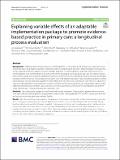Explaining variable effects of an adaptable implementation package to promote evidence-based practice in primary care : a longitudinal process evaluation
Abstract
Background Implementing evidence-based recommendations is challenging in UK primary care, especially given system pressures and multiple guideline recommendations competing for attention. Implementation packages that can be adapted and hence applied to target multiple guideline recommendations could offer efficiencies for recommendations with common barriers to achievement. We developed and evaluated a package of evidence-based interventions (audit and feedback, educational outreach and reminders) incorporating behaviour change techniques to target common barriers, in two pragmatic trials for four “high impact” indicators: risky prescribing; diabetes control; blood pressure control; and anticoagulation in atrial fibrillation. We observed a significant, cost-effective reduction in risky prescribing but there was insufficient evidence of effect on the other outcomes. We explored the impact of the implementation package on both social processes (Normalisation Process Theory; NPT) and hypothesised determinants of behaviour (Theoretical Domains Framework; TDF). Methods We conducted a prospective multi-method process evaluation. Observational, administrative and interview data collection and analyses in eight primary care practices were guided by NPT and TDF. Survey data from trial and process evaluation practices explored fidelity. Results We observed three main patterns of variation in how practices responded to the implementation package. First, in integration and achievement, the package “worked” when it was considered distinctive and feasible. Timely feedback directed at specific behaviours enabled continuous goal setting, action and review, which reinforced motivation and collective action. Second, impacts on team-based determinants were limited, particularly when the complexity of clinical actions impeded progress. Third, there were delivery delays and unintended consequences. Delays in scheduling outreach further reduced ownership and time for improvement. Repeated stagnant or declining feedback that did not reflect effort undermined engagement. Conclusions Variable integration within practice routines and organisation of care, variable impacts on behavioural determinants, and delays in delivery and unintended consequences help explain the partial success of an adaptable package in primary care.
Citation
ASPIRE programme team , Glidewell , L , Hunter , C , Ward , V , McEachan , R R C , Lawton , R , Willis , T A , Hartley , S , Collinson , M , Holland , M , Farrin , A J & Foy , R 2022 , ' Explaining variable effects of an adaptable implementation package to promote evidence-based practice in primary care : a longitudinal process evaluation ' , Implementation Science , vol. 17 , 9 . https://doi.org/10.1186/s13012-021-01166-4
Publication
Implementation Science
Status
Peer reviewed
ISSN
1748-5908Type
Journal article
Description
This study is funded by the National Institute for Health Research (NIHR) [Programme Grants for Applied Research (Grant Reference Number RP-PG-1209-10040)] (https://www.nihr.ac.uk/).Collections
Items in the St Andrews Research Repository are protected by copyright, with all rights reserved, unless otherwise indicated.

